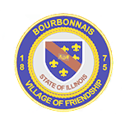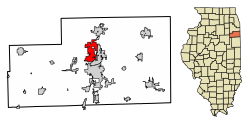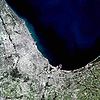Bourbonnais, Illinois
Bourbonnais | |
|---|---|
 Seal | |
| Motto: "Village of Friendship" | |
 Location of Bourbonnais in Illinois | |
 Location of Illinois in the United States | |
| Coordinates: 41°10′15″N 87°52′24″W / 41.17083°N 87.87333°W[1] | |
| Country | United States |
| State | Illinois |
| County | Kankakee |
| Named for | François Bourbonnais |
| Government | |
| • Mayor | Paul Schore[citation needed] (Bourbonnais Citizens Party) |
| Area | |
| • Total | 9.31 sq mi (24.12 km2) |
| • Land | 9.31 sq mi (24.12 km2) |
| • Water | 0.00 sq mi (0.00 km2) |
| Elevation | 696 ft (212 m) |
| Population (2020) | |
| • Total | 18,164 |
| • Density | 1,950.60/sq mi (753.15/km2) |
| Time zone | UTC-6 (CST) |
| • Summer (DST) | UTC-5 (CDT) |
| Zip code | 60914 |
| Area code(s) | 815 and 779 |
| FIPS code | 17-07471 |
| GNIS feature ID | 2398154[1] |
| Website | villageofbourbonnais.com |
Bourbonnais is a village in Kankakee County, Illinois, United States. The population was 18,164 at the 2020 census.
History
[edit]The village is named for François Jace Bourbonnais père, a fur trapper, hunter and agent of the American Fur Company, who had married a Native American woman and arrived in the area near the fork of two major Indian trails and the Kankakee River circa 1830.[4] John Jacob Astor had founded the company in 1808, and when the United States banned foreign (i.e. British and Canadian) companies (such as the Hudson's Bay Company) from competing in the country after the War of 1812, it flourished. By 1830 it had a near monopoly of fur trading in the midwest, but the number of local trappable wild animals had declined.
In 1832, Noel Le Vasseur arrived as the Astor firm local fur trading agent, establishing a trading post in the area, and becoming the first permanent non-Native American settler. He married Watseka, niece of a Potawatomi chieftain, and after the Potawatomi were relocated to Iowa, recruited French-Canadiens to settle around his store.[5] The Potawatomi were forced to move westward by a series of treaties culminating in the Treaty of Tippecanoe, which Congress ratified in 1833. The treaty reserved two sections for Potawanomi chief Me-she-ke-te-no, and one section each for Catish (Mrs. Bourbonnais Sr.) and Manteno (daughter of Francois Bourbonnais Jr.).[4] LeVasseur received considerable land through a series of shrewd trades, and eventually divorced Watseka and married a Canadian woman named Ruth.[6] After establishment of the new Catholic diocese of Chicago, missionary Fr. Stephen Badin briefly settled in Bourbonnais Grove in 1846, before retiring further south.

In 1853, the Illinois legislature split Iroquois County, and Bourbonnais Grove became part of new Kankakee County. Because the Illinois Central Railroad ran through Kankakee, founded in 1854, it became the county seat, with Bourbonnais Grove as one of several townships. In 1858, residents built the Maternity of the Blessed Virgin Mary Church, and soon nuns of the Congregation of Notre Dame arrived from Canada to teach and provide nursing care. Two years later they founded Notre Dame Academy. In 1865 clerics of St. Viator founded St. Viator College for boys.[7]
After a referendum in 1875, the settlement incorporated as the Village of Bourbonnais, with George R. LeTourneau as its first mayor, and trustees Francois Sequin, Joseph Legris, Alexis Gosselin, P.L. Monast, Alex LaMontagne, Joseph Goulet, Jacob Thyfault and Len Bessette. LeVasseur died, aged 80, four years later.[6] LeTourneau also became mayor and sheriff of Kankakee as well as state senator; his home (begun in 1837 and with renovations completed in 1866) eventually became headquarters of the local historical society, which is also restoring the garden and nearby arboretum.[8][9] After enrollment declines in the early 20th century, in 1940, the Catholic institutions were bought out by what became Olivet Nazarene University, since the Protestant school in nearby Vermillion County had burned down the previous year.
The original French pronunciation of Bourbonnais came to be Anglicized over time to /bərˈboʊnɪs/ bər-BOH-nis. In 1974, a state representative from Bourbonnais introduced a resolution "correcting" the pronunciation of the town's name to /bɜːrbəˈneɪ/ bur-bə-NAY, closer to the French.[10] In 1976, for the U.S. Bicentennial, the Village Board passed a resolution making "ber-buh-NAY" the official pronunciation.[11]
In 1999, the town was the site of a major train wreck, the Bourbonnais train accident.
Bourbonnais was home of the summertime training camp of the Chicago Bears professional football team from 2002 to 2019. In 2020, the team relocated their training camp to their headquarters at Halas Hall in Lake Forest, Illinois after major renovations of the building complex.[12]
Geography
[edit]According to the 2010 census, Bourbonnais has a total area of 9.31 square miles (24.11 km2), all land.[13]
Demographics
[edit]| Census | Pop. | Note | %± |
|---|---|---|---|
| 1900 | 595 | — | |
| 1910 | 611 | 2.7% | |
| 1920 | 620 | 1.5% | |
| 1930 | 685 | 10.5% | |
| 1940 | 771 | 12.6% | |
| 1950 | 1,598 | 107.3% | |
| 1960 | 3,336 | 108.8% | |
| 1970 | 5,909 | 77.1% | |
| 1980 | 13,280 | 124.7% | |
| 1990 | 13,934 | 4.9% | |
| 2000 | 15,256 | 9.5% | |
| 2010 | 18,631 | 22.1% | |
| 2020 | 18,164 | −2.5% | |
| US Decennial Census[14] | |||
As of the 2010 United States Census,[15] there were 18,854 people, 6,387 households in the village. The population density was 1,950.6/sqmi. The racial makeup of the village was 75.3% White alone, not Hispanic or Latino, 9.5% African American, 0.0% Native American, 2.3% Asian, 0.0% Pacific Islander, and 5.8% from two or more races. Hispanic or Latino residents of any race were 8.0% of the population.
The village population contained 19% under the age of 18 and 14.4% who were 65 years of age or older. There is a slightly higher percent of female persons at 52.9%.
The median income for a household in the village was $76,920. The per capita income for the village was $30,972. About 7.1% of the population were below the poverty line.
Sports
[edit]The Chicago Bears of the National Football League held their annual summer training camp at Olivet Nazarene University in Bourbonnais from 2002 through 2019.[16]
Education
[edit]Bourbonnais Elementary School District 53 (BESD53) serves local students from kindergarten to middle school.
Bourbonnais shares a high school, Bradley-Bourbonnais Community High School (BBCHS), with Bradley, Illinois The Kankakee Area Career Center (KACC) serves local area high school students as a vocational and technical education institution. Bourbonnais is served by three private high schools: Bishop McNamara Catholic School (Catholic), Grace Christian Academy[17] (non-denominational[18]), and Kankakee Trinity Academy (inter-denominational[19]).The village is home to Olivet Nazarene University (ONU), on the site of the old St. Viator College campus.
Infrastructure
[edit]Transportation
[edit]River Valley Metro provides bus service on multiple routes connecting Bourbonnais to destinations in the Kankakee area.[20]
Notable people
[edit]- Anthony Markanich, 1999: A soccer player who plays for Minnesota United in the Major League Soccer.
- Nick Markanich, 1999: A soccer player who plays for Charleston Battery in the USL Championship.
- Joseph Viateur "Léo" Dandurand, born 1889 He was the owner and coach of the Montreal Canadiens ice hockey team in the National Hockey League (NHL). He also was an owner of race tracks and of the Montreal Alouettes football team in the league that evolved into the Canadian Football League.
- Sam Yagan, born 1977 an American Internet entrepreneur best known as the co-founder of OkCupid. In 2013, he was named to TIME Magazine's '100 Most Influential People in the World' list. He is the vice-chairman of the e-dating site Match.com.
- Abbie Marie Boudreau, Born 1978 an American ABC television news correspondent. She joined ABC in November 2010. She was formerly with CNN. She has received seven regional Emmys for investigative reporting, writing and enterprise journalism. She also received regional Edward R. Murrow awards in both 2006 and 2007.
- Colin Holderman, 1995: a baseball player who plays for the Pittsburgh Pirates in Major League Baseball.
References
[edit]- ^ a b c U.S. Geological Survey Geographic Names Information System: Bourbonnais, Illinois
- ^ "Government webpage". Village of Bourbonnais. Retrieved July 7, 2017.
- ^ "2020 U.S. Gazetteer Files". United States Census Bureau. Retrieved March 15, 2022.
- ^ a b "History". Village of Bourbonnais. Archived from the original on October 30, 2012. Retrieved September 29, 2013.
- ^ "Local History". Bourbonnais Grove Historical Society. Archived from the original on January 14, 2012. Retrieved September 29, 2013.
- ^ a b Noel LeVasseur in Bourbonnais Illinois.wmv - via YouTube
- ^ "A Brief History". Viatorians.
- ^ "Letourneau Museum". Archived from the original on January 14, 2012.
- ^ "Bourbonnais". Antiquing Illinois. Archived from the original on August 17, 2014.
- ^ Mike Ramsey (January 10, 2006). "Legislator's name mentioned in Ryan trial, but in good way". SJ-R.COM. Archived from the original on March 17, 2006.
- ^ Callary, Edward (2009). Place names of Illinois. University of Illinois Press. pp. 41–42.
- ^ "Bears moving training camp to Halas Hall". Pro Football Talk. January 14, 2020. Retrieved October 2, 2020.
- ^ "Geographic Identifiers - 2010 Census Summary File 1". US Census Bureau. Archived from the original on February 13, 2020. Retrieved August 2, 2015.
- ^ "Census of Population and Housing". US Census Bureau. Retrieved June 4, 2015.
- ^ "U.S. Census website". US Census Bureau. Retrieved January 31, 2008.
- ^ "Bears moving training camp back to Halas Hall".
- ^ Leonhardt, Nicole (December 10, 2012). "Kankakee: Name change introduces Grace Christian Academy". The Daily Journal. Archived from the original on October 25, 2019. Retrieved July 16, 2021.
- ^ "Grace Baptist Academy". gracecrusaders.org. Grace Baptist Academy. Archived from the original on March 9, 2012. Retrieved June 8, 2012.
- ^ "Our Purpose". Kankakee Trinity Academy. Archived from the original on May 16, 2012. Retrieved June 8, 2012.
- ^ "System Map" (PDF). Retrieved January 28, 2024.


